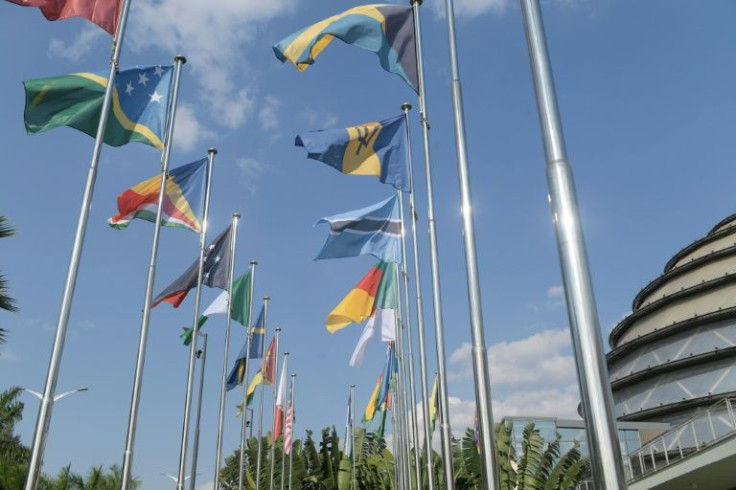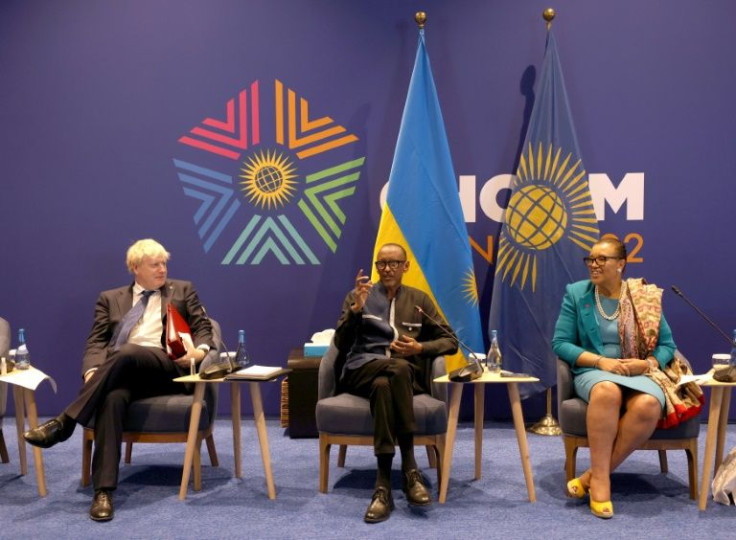Kagame Defends Rwanda On Rights As Commonwealth Expands
President Paul Kagame on Saturday fiercely defended Rwanda's record on human rights and political freedoms as the curtains closed on a Commonwealth summit where his country came under intense scrutiny.
The Commonwealth also welcomed two new members into the fold at its summit in Kigali -- the French-speaking West African states of Togo and Gabon that have no historic ties to Britain.
The decision to hold the gathering in Rwanda was heavily criticised by rights watchdogs, which accused Commonwealth leaders of turning a blind eye to repression and the jailing of opponents in the host country.
Kagame, who has been de facto ruler since the end of the genocide in 1994, told reporters Rwanda was proud of its record and would not be lectured by outsiders.
"As far as values are concerned, we don't need any lessons from BBC or from anyone," Kagame said in an impassioned statement that lasted nearly 30 minutes.
"I want to assure you there is nobody... who (is) beholding values better than we do here in Rwanda," he told the summit's closing press conference.
Ahead of the meeting attended by Prince Charles and around 30 leaders, rights groups warned that Kigali's sparkling streets had been cleared of the homeless and street kids to maintain a glossy image for visitors.
In an open letter, 23 civil society organisations said there was a "climate of fear" in Rwanda and urged Commonwealth leaders not to risk the body's integrity by letting Kagame off the hook.

His government had presided over a crackdown on rights of assembly, enforced disappearances, arbitrary detention, torture and extrajudicial executions, they said.
Kagame rejected any suggestion his government detained opponents, saying some of his most vocal critics had been freed from prison by presidential pardon.
"There is nobody in Rwanda who is in prison that should not be there, because we have a justice system that is actually functional, and fair," he said.
Kagame also announced that Gabon and Togo had been admitted into the Commonwealth, the first new members since Rwanda in 2009.
"This is a historic moment! A new important page in the history of Gabon is opening 62 years after its independence," Gabonese President Ali Bongo said in a statement.
Togo's Foreign Minister Robert Dussey said membership opened the door to 2.5 billion consumers in the Commonwealth realm, offered new education opportunities, and tapped a "craze" for English among his countrymen.

Francophone states have also sought to join the Commonwealth in recent years to pivot away from former colonial ruler France, analysts said.
The admission of Gabon and Togo takes membership to 56 nations, and is a boon for the Commonwealth at a time of renewed discussion over its future relevance and modern profile.
Republican movements are taking root in a number of Commonwealth nations and some are seeking reparations for colonial-era injustices.
On Friday, Prince Charles told Commonwealth leaders the choice to become a republic or abandon Queen Elizabeth II as head of state was theirs alone and expressed "personal sorrow" at Britain's legacy of slavery.
And British Prime Minister Boris Johnson said the interest from new members proved the organisation was alive and well.
But the admission of Gabon and Togo could raise questions about the Commonwealth's espoused commitment to good governance, respect of rights and democracy as fundamental values of its charter.
Both countries have been ruled by single families for over half a century, and elections have been marred by irregularities and violence.
"We are much better together than we ever will be apart," said Patricia Scotland, who was re-elected in Kigali for another two years as Commonwealth secretary-general after a bruising and divisive campaign.
Delegates at the Commonwealth Heads of Government Meeting (CHOGM) addressed issues including climate change, violence against women, mental health, vaccine equity, and urbanisation -- to name a few.
A much-criticised deal to deport asylum-seekers from the UK to Rwanda dogged the meeting, however, with Johnson vigorously defending his policy.
Ahead of the summit it was reported that Charles -- who takes over the Commonwealth when he becomes king -- strongly opposed the migrant scheme.
The first transfer of asylum seekers scheduled this month was blocked in a European court, but Johnson insists the deal is not unlawful and he will pursue it.
Born out of the British Empire, the Commonwealth represents one-third of humanity in nations across Africa, Asia, Europe and the Americas.
The next Commonwealth meet will be in Samoa in 2024.
© Copyright AFP 2024. All rights reserved.











